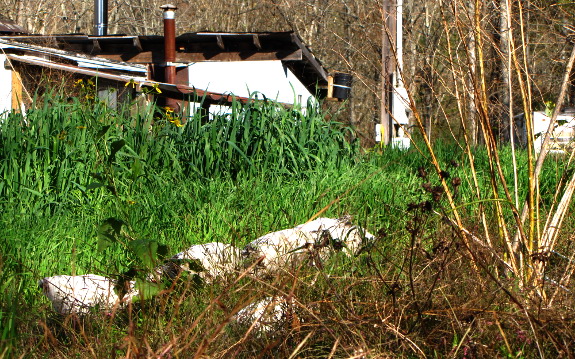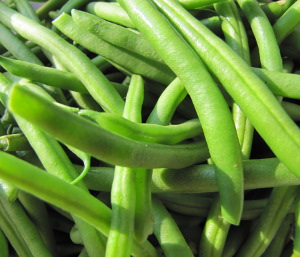
Building soil

My garden soil feels
very different this year than it has in the past. I've never seen
so many worms, especially the huge nightcrawlers that love a steady
supply of mulch. And I've never had soil so rich, dark, and
alive. After four years of maintaining soil, I feel like in 2011 I
finally built soil.
I made three big changes
in the garden over the last year. I kept a constant straw mulch
whenever possible, I doubled my application rate of horse manure
compost to a full inch before every crop, and I slipped in cover crops whenever possible.
The plants responded
with astonishing bounty, with one notable exception. We had a
terrible time with Mexican bean
beetles this year,
which I suspect is due to the high application rate of compost.
I've read that if you feed beans too much, the nitrogen in their leaves
is in a slightly different form that's tastier to bean beetles than if
they'd made the  proteins
by fixing nitrogen out of the air. I tested this hypothesis by
planting my last bed of beans with no compost at all, and that was the
one bed where the bean beetles barely made any headway --- the insects
were present, but were darker in color and seemed to be growing much
more slowly. The beans, on the other hand, grew vigorously and
churned out dozens of dinners. The experiment was far from
definitive because the lower bean beetle vigor could have just been due
to the decline of the gardening year, but I think I'll cut back on the
compost going to my beans next year. For the rest of the garden,
though, I wouldn't change a thing.
proteins
by fixing nitrogen out of the air. I tested this hypothesis by
planting my last bed of beans with no compost at all, and that was the
one bed where the bean beetles barely made any headway --- the insects
were present, but were darker in color and seemed to be growing much
more slowly. The beans, on the other hand, grew vigorously and
churned out dozens of dinners. The experiment was far from
definitive because the lower bean beetle vigor could have just been due
to the decline of the gardening year, but I think I'll cut back on the
compost going to my beans next year. For the rest of the garden,
though, I wouldn't change a thing.
Want more in-depth information? Browse through our books.
Or explore more posts by date or by subject.
About us: Anna Hess and Mark Hamilton spent over a decade living self-sufficiently in the mountains of Virginia before moving north to start over from scratch in the foothills of Ohio. They've experimented with permaculture, no-till gardening, trailersteading, home-based microbusinesses and much more, writing about their adventures in both blogs and books.
Want to be notified when new comments are posted on this page? Click on the RSS button after you add a comment to subscribe to the comment feed, or simply check the box beside "email replies to me" while writing your comment.

Well that's interesting. I fought the bean beetles last year and this year. They were so bad that I was tempted to spray chemicals to control them. This year I even pulled my crop much earlier than I would have without the beetles. I plant in raised beds whose soil is at least half yard waste compost. While that is great for all other crops, maybe it was a mistake to use so much compost in the beds.
I haven't been too active on the straw mulch over the winter and cover crops. Maybe I need to rethink things. I'll add the straw mulch and see if I can come up with some cover crops that will get started before the freeze comes.
Eric --- Thanks for your kind words! I can tell the gardeners I have the most in common with because they envy other peoples' soil, not their gardens. I feel the same way about certain soil I have seen....
I feel the same way about certain soil I have seen....
Fritz --- I wouldn't be surprised if the compost was your problem. You could try doing what I did with my last batch --- plant them directly after a hungry feeder like sweet corn. It's really the nitrogen in the soil that you want to limit for beans, so a simple rotation like that should do the trick.
Cesar --- Sounds like you've got a great opportunity for growth! Just think of all the minerals and good drainage from those rocks, once you add plenty of organic matter on top.